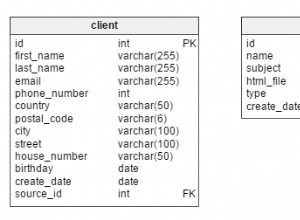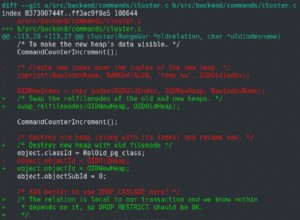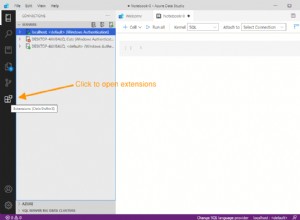Domyślam się, że używasz domyślnego random_page_cost = 4 , który jest zbyt wysoki, przez co skanowanie indeksu jest zbyt kosztowne.
Próbuję zrekonstruować 2 tabele za pomocą tego skryptu:
CREATE TABLE replays_game (
id integer NOT NULL,
PRIMARY KEY (id)
);
CREATE TABLE replays_playeringame (
player_id integer NOT NULL,
game_id integer NOT NULL,
PRIMARY KEY (player_id, game_id),
CONSTRAINT replays_playeringame_game_fkey
FOREIGN KEY (game_id) REFERENCES replays_game (id)
);
CREATE INDEX ix_replays_playeringame_game_id
ON replays_playeringame (game_id);
-- 150k games
INSERT INTO replays_game
SELECT generate_series(1, 150000);
-- ~150k players, ~2 games each
INSERT INTO replays_playeringame
select trunc(random() * 149999 + 1), generate_series(1, 150000);
INSERT INTO replays_playeringame
SELECT *
FROM
(
SELECT
trunc(random() * 149999 + 1) as player_id,
generate_series(1, 150000) as game_id
) AS t
WHERE
NOT EXISTS (
SELECT 1
FROM replays_playeringame
WHERE
t.player_id = replays_playeringame.player_id
AND t.game_id = replays_playeringame.game_id
)
;
-- the heavy player with 3000 games
INSERT INTO replays_playeringame
select 999999, generate_series(1, 3000);
Z domyślną wartością 4:
game=# set random_page_cost = 4;
SET
game=# explain analyse SELECT "replays_game".*
FROM "replays_game"
INNER JOIN "replays_playeringame" ON "replays_game"."id" = "replays_playeringame"."game_id"
WHERE "replays_playeringame"."player_id" = 999999;
QUERY PLAN
-----------------------------------------------------------------------------------------------------------------------------------------------------
Hash Join (cost=1483.54..4802.54 rows=3000 width=4) (actual time=3.640..110.212 rows=3000 loops=1)
Hash Cond: (replays_game.id = replays_playeringame.game_id)
-> Seq Scan on replays_game (cost=0.00..2164.00 rows=150000 width=4) (actual time=0.012..34.261 rows=150000 loops=1)
-> Hash (cost=1446.04..1446.04 rows=3000 width=4) (actual time=3.598..3.598 rows=3000 loops=1)
Buckets: 1024 Batches: 1 Memory Usage: 106kB
-> Bitmap Heap Scan on replays_playeringame (cost=67.54..1446.04 rows=3000 width=4) (actual time=0.586..2.041 rows=3000 loops=1)
Recheck Cond: (player_id = 999999)
-> Bitmap Index Scan on replays_playeringame_pkey (cost=0.00..66.79 rows=3000 width=0) (actual time=0.560..0.560 rows=3000 loops=1)
Index Cond: (player_id = 999999)
Total runtime: 110.621 ms
Po obniżeniu do 2:
game=# set random_page_cost = 2;
SET
game=# explain analyse SELECT "replays_game".*
FROM "replays_game"
INNER JOIN "replays_playeringame" ON "replays_game"."id" = "replays_playeringame"."game_id"
WHERE "replays_playeringame"."player_id" = 999999;
QUERY PLAN
-----------------------------------------------------------------------------------------------------------------------------------------------
Nested Loop (cost=45.52..4444.86 rows=3000 width=4) (actual time=0.418..27.741 rows=3000 loops=1)
-> Bitmap Heap Scan on replays_playeringame (cost=45.52..1424.02 rows=3000 width=4) (actual time=0.406..1.502 rows=3000 loops=1)
Recheck Cond: (player_id = 999999)
-> Bitmap Index Scan on replays_playeringame_pkey (cost=0.00..44.77 rows=3000 width=0) (actual time=0.388..0.388 rows=3000 loops=1)
Index Cond: (player_id = 999999)
-> Index Scan using replays_game_pkey on replays_game (cost=0.00..0.99 rows=1 width=4) (actual time=0.006..0.006 rows=1 loops=3000)
Index Cond: (id = replays_playeringame.game_id)
Total runtime: 28.542 ms
(8 rows)
Jeśli używasz SSD, obniżyłbym go dalej do 1,1.
Jeśli chodzi o twoje ostatnie pytanie, naprawdę uważam, że powinieneś pozostać przy postgresql. Mam doświadczenie z postgresql i mssql i muszę włożyć trzy razy więcej wysiłku w późniejszy, aby działał o połowę lepiej niż pierwszy.




